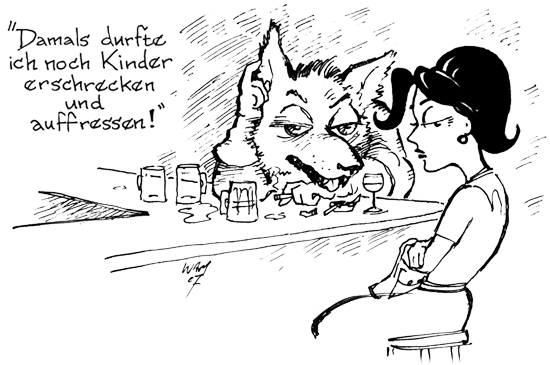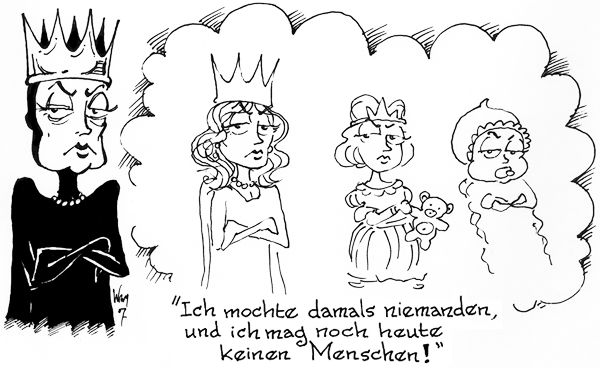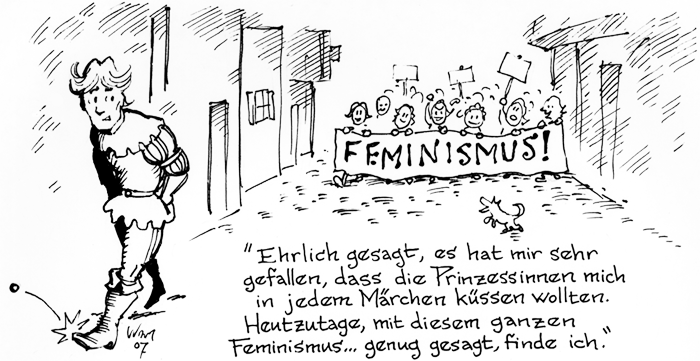10.6.1.4: Modalverben in der Vergangenheit
- Page ID
- 108509
Verbs: Modalverben im Imperfekt
Just as modal verbs do in the present tense, they also modify other verbs in the past tense as well; they provide some nuance or suggest some emotional reaction to an action.
Thus, modal verbs modify other verbs. They are most often used along with an infinitive - the basic form of a verb, what you would find in the dictionary - which comes at the end of the sentence or the clause.
Modal verbs in the past tense
| 1. dürfen • durfte • be allowed to, be permitted to | |
| ich durfte | wir durften |
| du durftest | ihr durftet |
| er/sie/es durfte | sie durften |
In der wöchentliche Therapiestunde ... (In the weekly therapy session)
| Aschenputtel | Also, fangen wir damit an, was wir in den alten Märchen machen durften ... und auch was wir nicht durften. Wer will beginnen? | So, let's begin with what we were allowed to do and also what we weren't allowed in the old fairy tales. Who wants to begin? |
| Wolfdietrich | Damals durfte ich noch Kinder erschrecken und auffressen!!! | Back then I was still allowed to scare and eat children!!! |

| 2. können • konnte • able to, can | |
| ich konnte | wir konnten |
| du konntest | ihr konntet |
| er/sie/es konnte | sie konnten |
| die alte Hexe | Tja, in den alten Zeiten konnte ich noch so richtig gut zaubern... Jetzt sind alle meine Versuche wie verhext! | Well, in the good old times I could still do some darned good magic ... Now, it seems like all my attempts are jinxed! |
| der Froschkönig | Ja, und die Prinzessinnen konnten meinem Charme gar nicht widerstehen ... Wenn doch nur die Gebrüder Grimm heute noch die Fäden in der Hand halten könnten! | Yeah, and the princesses could not resist my charm ... If only the Brothers Grimm were still at the helm today! |
| 3. mögen/möchten • mochte • like/would like (to) | |
| ich mochte | wir mochten |
| du mochtest | ihr mochtet |
| er/sie/es mochte | sie mochten |
mögen and möchten only have one simple past form (because möchten is merely a form of mögen as well!). In the past tense, mögen can be used either with an infinitive or with a direct object.
| die böse Königin | Mein Leben ist selbst heute noch dasselbe: Ich mochte damals niemanden, und ich mag heute auch keinen Menschen! | My life is still the same today: I didn't like anybody then, and I still don't like a single person today! |
| Chef | Ganz im Gegenteil, unser Leben ist völlig anders. Im originalen Märchen mochten wir es, im Bergbau zu arbeiten, aber heute finden wir das zu umweltfeindlich ... Oder haben wir nur in der Disneyversion so viel gesungen? | In total contrast, our life is completely different. In the original fairy tale, we liked to work in the mine, but today we find that too harmful for the environment ... Or did we only sing so much in the Disney version? |

| 4. müssen • musste • must, have to | |
| ich musste | wir mussten |
| du musstest | ihr musstet |
| er/sie/es musste | sie mussten |
| der Jäger | Wie Sie alle wissen, musste ich in einem Märchen der bösen Königin dienen! Ich habe das sooooo gehasst! (er schaudert und seufzt traurig) | As you all know, in one fairy tale I had to serve the evil queen! I really hated that! (he shivers and sighs sadly) |
| der alte König | Man muss nichts müssen! Man muss sich immer selbst entscheiden, was man tun will ... | People did not have to do anything! You always have to determine for yourself what you want to do ... |
| Brummbär | Das ist doch alles Quatsch! Wir mussten alle machen, was die Gebrüder Grimm - und ehrlich gesagt, die deutsche Gesellschaft im 19. Jahrundert - uns vorgeschrieben hatte! | That's total nonsense! We all had to do what the Brothers Grimm - and in all honesty, the German society of the 19th century - dictated to us! |
| 5. sollen • sollte • supposed to | |
| ich sollte | wir sollten |
| du solltest | ihr solltet |
| er/sie/es sollte | sie sollten |
| das brave Mädchen | Ich sollte jeden Tag Frau Holles Bett aufschütteln, dann sollte es auf der Welt schneien. | I was supposed to shake up Frau Holle's bed every day, and then it was supposed to snow on Earth. |
| Dornröschen | Das ist doch nichts! Ich sollte sterben! Mit 15!! Aber die 13. gute Weise konnte mein Todesurteil reduzieren, und ich musste nur 100 Jahre lang schlafen. Gott sei dank sollte damals das Gute immer siegen! | That's nothing! I was supposed to die! At age 15!! But the 13th wise woman could reduce my death sentence and I only had to sleep for 100 years. Thank heavens the Good was always supposed to win over evil back then! |
| 6. wollen • wollte • want to | |
| ich wollte | wir wollten |
| du wolltest | ihr wolltet |
| er/sie/es wollte | sie wollten |
| Aschenputtel | Hänsel und Gretel, was wolltet ihr machen? | Hänsel und Gretel, what did you want to do? |
| Gretel | Was für eine dumme Frage!?! Natürlich wollten wir zurück zu unserem Vater. Und ich wollte keinesfalls für eine alte Hexe das Mittagessen werden! | What a dumb question!?! Of course we wanted to get back to our father. And I by no means wanted to become lunch for an old hag! |
Word order
Modal verbs in the past tense follow the same patterns as they did in the present tense.
Basic
The conjugated modal verb takes the second position in a sentence or clause, and an infinitive comes at the end of the sentence or clause.
| Aschenputtel | Ich hasste mein Märchen! Ich musste jeden Tag Erbsen und Linsen aus der Asche lesen. Was für eine absolut sinnlose Aufgabe! | I hated my fairy tale. I had to sort peas and lentils from the ashes every day. What an absolutely meaningless task! |
With coordinating conjunctions
The same pattern - conjugated modal verb in second position and infinitive at the end of a sentence or clause - holds true when two sentences – that become two clauses of a new, complex sentence – are connected by coordinating conjunctions: aber, beziehungsweise, denn, entweder ... oder ..., oder, sondern, und, weder ... noch ...
| der Esel | Ich war schon damals sehr alt. Ich musste von zu Hause weglaufen, denn ich konnte nicht mehr arbeiten. Sonst wäre ich ermordet worden! | I was already then very old. I had to run away from home, because I couldn't work around the house anymore. Otherwise I would have been murdered! |
With subordinating conjunctions
Just as with present tense modal verbs, the word order changes drastically with subordinating conjunctions, such as als, bevor, dass, ob, weil, for example. The conjugated verb (here, the modal verb) goes to the end of the sentence or clause with the subordinating conjunction.
| Thilo | Ehrlich gesagt, es hat mir sehr gefallen, dass die Prinzessinnen mich in jedem Märchen küssen wollten. Naja, und heutzutage, mit diesem ganzen Feminismus ..., genug gesagt, finde ich. | To tell the truth, I really used to like that the princesses wanted to kiss me in each fairy tale. Today, with this whole feminism thing ... enough said, I think. |

Present perfect
The modal verbs are rarely used in the present perfect tense, even in spoken language. The present perfect forms mean the same as the simple past ones, and just so you recognize them if they ever appear, here is a quick overview:
| dürfen | können | mögen/möchten | |||||
| ich habe | gedurft | ich habe | gekonnt | ich habe | gemocht | ||
| du hast | du hast | du hast | |||||
| er/sie/es hat | er/sie/es hat | er/sie/es hat | |||||
| wir haben | wir haben | wir haben | |||||
| ihr habt | ihr habt | ihr habt | |||||
| sie/Sie haben | sie/Sie haben | sie/Sie haben | |||||
| müssen | sollen | wollen | |||||
| ich habe | gemusst | ich habe | gesollt | ich habe | gewollt | ||
| du hast | du hast | du hast | |||||
| er/sie/es hat | er/sie/es hat | er/sie/es hat | |||||
| wir haben | wir haben | wir haben | |||||
| ihr habt | ihr habt | ihr habt | |||||
| sie/Sie haben | sie/Sie haben | sie/Sie haben | |||||


